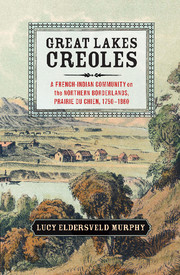 Great Lakes Creoles
Great Lakes Creoles Book contents
- Frontmatter
- Dedication
- Contents
- List of Tables
- List of Figures
- Acknowledgments
- Introduction
- 1 “The Rightful Owners of the Soil”
- 2 “To Intermeddle in Political Affairs”
- 3 “Damned Yankee Court and Jury”
- 4 Public Mothers
- 5 “A Humble … People”
- 6 Blanket Claims and Family Clusters
- Conclusion
- Epilogue
- Index
- References
5 - “A Humble … People”
Economic Adaptations
Published online by Cambridge University Press: 05 September 2014
- Frontmatter
- Dedication
- Contents
- List of Tables
- List of Figures
- Acknowledgments
- Introduction
- 1 “The Rightful Owners of the Soil”
- 2 “To Intermeddle in Political Affairs”
- 3 “Damned Yankee Court and Jury”
- 4 Public Mothers
- 5 “A Humble … People”
- 6 Blanket Claims and Family Clusters
- Conclusion
- Epilogue
- Index
- References
Summary
When he was an old man, Antoine Grignon fondly remembered his childhood in Prairie du Chien (Figure 5.1). Born there in 1828 to mother Archange LaBathe, who was Dakota and French, and Amable Grignon, who was Ho-Chunk and French, he grew up during the 1830s and early 1840s, a time of change for the community. Nostalgia brought to mind Prairie du Chien in its fur-trade heyday. Grignon told an interviewer in 1904, “In looking over the departed years, I can see Prairie du Chien as it was when I played along its streets as a boy. The strange, wild life of the hunters, traders, and trappers thrilled me, and I was often on hand to see the fleets of canoes from the northland with their throng of painted Indians or, to see the voyageurs arrive with their bateaux of furs.”
Within a generation of his birth, scenes like this would become rare. Within a decade, Creoles became a minority in Prairie du Chien. During the first three decades of Grignon’s life, Indian removal, fur-trade decline, Anglo-Yankee and European immigration, and commercial and occupational changes added to the difficulties Creole voters, officials, and jurors faced (challenges discussed in Chapters 2 and 3). As Creoles’ political authority declined, they sought ways to maintain as much economic autonomy as possible. They had to decide whether to stay and adapt or to move away, following the Native people and fur trade or looking for other opportunities to the north and west. This chapter focuses on the economic winds of change and the ways that some Creoles weathered these storms.
- Type
- Chapter
- Information
- Great Lakes CreolesA French-Indian Community on the Northern Borderlands, Prairie du Chien, 1750–1860, pp. 187 - 240Publisher: Cambridge University PressPrint publication year: 2014
